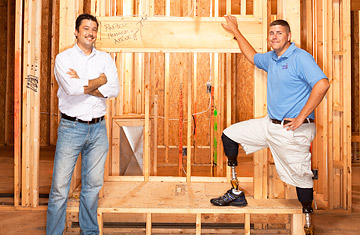
(5 of 5)
Stann told me that despite this work, he still struggles with survivor's guilt. But not too much. "It's easy to control PTSD," the middleweight says, "when you get to punch somebody in the face every day."
And then there are those who find their way into public service because they simply enjoy hanging out with other vets and doing good things. Jake Wood joined the Marines after graduating from the University of Wisconsin in 2004 because "I wasn't ready to put on a suit. The idea of Goldman Sachs didn't sound too appealing." Jake is an enormous man, a former offensive tackle at Wisconsin. He served two rough tours as a sergeant in Iraq and Afghanistan, then left the military because he'd compounded old football injuries on patrol. "So there I was in January 2010, filling out my business-school applications and feeling pretty bored, when I heard about the earthquake in Haiti. I knew that I could help out. There were thousands injured, looting, mobs in the streets, but I knew it wasn't going to be any worse than Fallujah. So I went on Facebook to see if any of my friends were interested." Four friends were, including William McNulty, who had a connection with the Jesuits in Haiti. Woods raised $6,000 in a day on Facebook. They were in Haiti 72 hours later. "There was a lot of looting and chaos," says McNulty. "Other relief agencies don't like those sorts of situations, but we'd seen a lot worse. We know how to do chaos. We're Marines."
They spent 20 days in Haiti helping organize medical facilities. When they got home, Jake's father told them they had $150,000 in donations they hadn't used. "You can either give it back, pay taxes on it or form a 501(c)(3)," he said — and Team Rubicon was born. They now have 500 former noncoms who serve as volunteers.
"After I got out of the Rangers," says Ford Sypher, a University of Kansas graduate now trying to decide between pursuing a Ph.D. in global studies or a medical degree, "I was looking for something to fill the void. It was like losing your family." Then McNulty invited him to join an Alabama tornado-relief crew. "I rented a chainsaw, and within 20 minutes it felt like I was back in the service again. We shared a common language and knew how to organize ourselves to work efficiently. I took a team to Walker County, and FEMA offered us trailers to live in. We refused because we're used to sleeping on the ground; other people aren't. You know, our generation of vets isn't really into joining organizations like the VFW or the Legion, but we do have a need to share our stories and experiences. When we go out on these disaster-relief missions, it's very therapeutic — and we're doing something tangible and immediate to help people."
"You're a Marine Captain. Figure It Out."
It will be decades before we find out if these veterans will prove, as Petraeus believes, the next great generation of American leaders. "It will be a phenomenal waste if 10 years from now, we turn out to be just another interest group, limiting ourselves to veterans' issues," says Michael Breen, vice president of the Truman National Security Project, which has provided a home in the Democratic Party for returning veterans with a desire for public service. Breen need not worry too much. The vets are just beginning to understand the value of the skills they have to offer, the amazing things they may be able to accomplish as civilians. In the coming years, people like Eric Greitens, Wes Moore and Liz McNally may run for office; an Iraq or Afghanistan veteran, or two, may someday be elected President — and he or she will bring to office the sense of grace under pressure, of purposeful leadership that comes from service in combat, an experience that none of the baby-boom Presidents have had.
For now, just listening to them talk about their experiences is thrilling. Seth Moulton returned from his last tour working for Petraeus in 2007 and did a joint master's program at Harvard's Business School and Kennedy School of Government. He and his friend David Callaway, a former combat surgeon who was then affiliated with the Harvard Medical Faculty Physicians, were sitting together at a Truman Project conference when Callaway got word of the Haiti earthquake. Harvard wanted him to organize a team of doctors to help out. "I turned to Seth and said, 'I need you to go down there and start organizing logistics,'" Callaway told me. "Seth said, 'I don't know anything about medical logistics.' And I told him, 'Seth, you're a Marine captain. Figure it out.'"
Moulton went to Haiti and quickly began reorganizing the main hospital in Port-au-Prince. "There were bodies outside the building that needed to be disposed of," he recalls. "And there was total confusion about operating schedules, so I had to work that out. It turned out that I did have some skills that were useful." All the medical records had been destroyed, and there were no working computers. Moulton came up with another idea. "We could develop something like an iPhone app for doctors to input into the new system," he told me. "When the U.N. heard about that, they wanted us to develop it for them. They invited our team to a meeting in Santo Domingo — but when we got there, we realized we didn't have a business plan. We had an hour before the meeting, and I just sat down and wrote a five-point action memo. Dave said, 'I knew your Harvard Business School training would come in handy.' And I said to him, 'Harvard Business School! I learned how to do that in the United States Marines.'"
